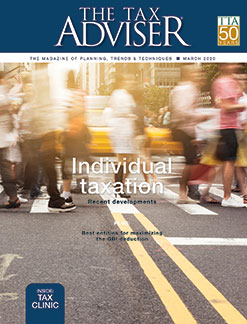- column
- From the Tax Adviser
Why states need to enact MTC model statute in 2020
Please note: This item is from our archives and was published in 2020. It is provided for historical reference. The content may be out of date and links may no longer function.
Related
Businesses urge Treasury to destroy BOI data and finalize exemption
How to ease taxes on inherited IRAs
Company lacks standing to sue ERTC advisers

Important changes in the federal partnership audit rules began to apply for tax years beginning Jan. 1, 2018, for many partnerships (enacted as part of the Bipartisan Budget Act of 2015, P.L. 114-74). With extended 2018 partnership returns timely filed by Sept. 15, 2019, the IRS is expected to begin to conduct audits using the new partnership audit regime in 2020. In anticipation of increased partnership audit activity, states are starting to react and enact (or at least consider) legislation regarding the new federal partnership audit process.
States incorporate the Internal Revenue Code (IRC) “tax base” into their tax laws in various ways. However, states’ conformity to the IRC’s assessment and refund laws varies widely, with most states adopting their own independent assessment and refund laws that are distinctly separate from those in the IRC. Therefore, almost every state that imposes an individual and/or corporate income tax needs to amend its federal adjustment reporting laws to account for the new federal partnership audit regime procedures for the process to work fairly, both for the state and for taxpayers who hold interests in impacted partnerships.
For example, the laws of many states do not allow for the direct assessment of partnerships, as these entities are not taxpayers upon which the state may assess, collect, or levy a tax. In other states, the partnership itself is the taxpayer; thus, the impact is less significant because individual assessment against a partner is not permitted, as the state may not subject its partners (e.g., individuals) to state income taxation on the income earned by a partnership. However, most states assess partners directly; therefore, many states will need to enact legislation that allows them to also assess the partnership, following the new federal regime. State tax authorities will need to issue guidance to explain how they will implement any changes.
The Multistate Tax Commission’s (MTC’s) Model Uniform Statute and Regulation for Reporting Adjustments to Federal Taxable Income and Federal Partnership Audit Adjustments provides states with a reasonable method to collect revenue for their share of liabilities flowing from an IRS audit of a partnership or multimember limited liability company and not face substantial legal and administrative concerns.
The MTC model statute, approved by the MTC in January 2019, was developed and is supported by the “interested parties,” which include the AICPA and several other organizations involved with state tax policy, including the Council on State Taxation, the Tax Executives Institute, the American Bar Association State and Local Taxes Committee, the Institute for Professionals in Taxation, and the Energy Infrastructure Council (formerly the Master Limited Partnership Association).
The MTC model statute addresses reporting federal changes for all taxpayers and addresses issues with taxpayers reporting adjustments under the new federal partnership audit regime. The MTC model statute was designed to provide states with a uniform, simplified method to apply the results of a partnership audit conducted by the IRS under the new federal procedures in effect for tax years beginning Jan. 1, 2018 (partnerships could have opted in earlier, but few did). One of the stated goals of the new federal regime is to improve the process of reporting of federal audit adjustments to the states. This new federal partnership audit process change also creates a unique opportunity to improve the overall process for all taxpayers to report federal changes to the states (and, as applicable, local governments).
In addition, many CPAs and their clients are structured as partnerships and operate in many states and, thus, are directly subject to the new federal and state partnership audit regimes.
Until all affected states adopt the MTC model statute, CPAs and their clients could face complications and burdensome compliance challenges from the inconsistent requirements across states for reporting their federal audit adjustments to state tax authorities.
For a detailed discussion of the issues in this area, see “State & Local Taxes: Why States Should Adopt the MTC Model for Federal Partnership Audits,” in the March 2020 issue of The Tax Adviser.
— Eileen Reichenberg Sherr, CPA, CGMA
The Tax Adviser is the AICPA’s monthly journal of tax planning, trends, and techniques.
Also in the March issue:
- An update on developments affecting individuals.
- A discussion of optimal choice of entity for the qualified business income deduction.
- A look at private foundations and donor-advised funds.
AICPA members can subscribe to The Tax Adviser for a discounted price of $85 per year. Tax Section membership includes a one-year subscription to The Tax Adviser.


















